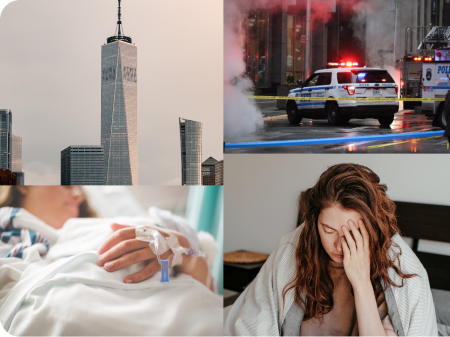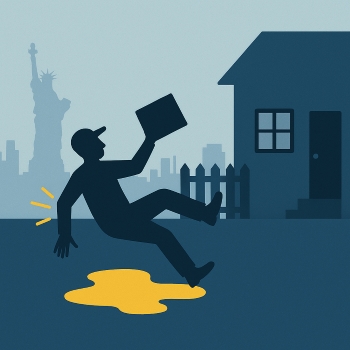Thousands of delivery workers crisscross New York City daily—on foot, by bike, or behind the wheel. They navigate icy stoops, broken sidewalks, dimly lit hallways, and slick marble lobbies to get the job done. But what happens when unsafe property conditions cause a serious injury?
If you suffered a premises liability delivery worker injury in New York, you may have the right to pursue compensation. This blog explains what delivery workers need to know about their legal options after an injury.
Slip and Fall While Delivering in New York? Reach Out to Ferrante & Koenig 24/7 for a Free Consult.
Why Delivery Workers Face Higher Risks
Delivery work in New York is physically demanding. You are constantly entering unfamiliar properties, both public and private, and are often under pressure to meet delivery windows.
Common hazards that cause delivery worker injuries include:
- Icy or snow-covered entryways,
- Loose or broken steps,
- Missing or damaged handrails,
- Wet or freshly mopped floors without warning signs,
- Unsecured mats or rugs,
- Cluttered or obstructed pathways,
- Cracked or uneven sidewalks, and
- Poor lighting in stairwells and hallways.
If a property owner failed to address these hazards or adequately warn visitors, you may have a valid legal claim.
What Is Premises Liability?
Premises liability is the area of law that holds property owners accountable for unsafe conditions on their property. In New York, owners must:
- Maintain reasonably safe conditions,
- Inspect the property regularly,
- Fix hazards in a reasonable time, and
- Warn visitors of dangers they cannot immediately correct.
Delivery workers are considered lawful visitors. Property owners typically owe them a duty of care under New York law. If you suffered a premises liability delivery worker injury in New York, the owner’s failure to uphold this duty could form the basis of your personal injury claim.
Who Can You Sue?
One key question is: Who is responsible for the condition of the property where you were injured? The answer depends on where the injury occurred:
Private Residences
The property owner or landlord is usually liable for injuries at homes, condos, or apartment buildings.
Commercial Properties
For falls at businesses, such as stores, restaurants, or offices, you may sue the property owner, the business tenant, or both. In some cases, property management companies may also share responsibility.
Government-Owned Properties
If you were injured on city-owned property, such as a municipal building, public housing, or certain sidewalks, you may have to file a claim against the City of New York. These cases follow different deadlines and procedures.
What You Need to Prove
To bring a successful claim, you generally must prove that:
- A dangerous condition existed on the property,
- The property owner (or responsible party) knew or should have known about the hazard,
- They failed to fix the hazard or warn about it in time, and
- The unsafe condition caused your injury.
In legal terms, this is the process of proving negligence, and it forms the basis of your personal injury claim.
How Do You Build a Strong Case?
Here are the key steps delivery workers should take after an injury:
- Document the scene. If possible, take photos or video of the hazard as soon as possible. Conditions often change quickly—snow gets cleared, floors get cleaned, and lighting gets repaired.
- Seek medical attention. Even if your injuries seem minor, getting checked out is essential. Medical records provide critical evidence for your case.
- Report the incident. If the injury happened at a business or apartment building, report it to management or the building superintendent. Request a copy of any incident report.
- Gather witness information. If anyone saw your fall, get their name and contact information. Witnesses can help confirm that the hazard existed.
- Contact an attorney. Premises liability cases can be complex. An attorney can help preserve evidence, identify liable parties, and handle the legal process.
What Compensation Can You Recover?
If your claim is successful, you may recover compensation for:
- Medical bills (ER visits, therapy, surgeries, medications);
- Lost wages if you missed work due to your injury;
- Reduced future earnings if your injury limits your ability to work;
- Pain and suffering; and
- Permanent disability or long-term effects.
The amount depends on the severity of your injury, your medical treatment, and how the injury impacts your life.
Special Deadlines for Claims Against the City
If your premises liability delivery worker injury in New York occurred on city-owned property, strict deadlines apply. These deadlines are considerably shorter than those for injuries that occur on private or commercial property. You must file a Notice of Claim within 90 days of the accident, and file your lawsuit within one year and 90 days of the accident.
Missing these deadlines can prevent you from recovering compensation, even if your claim is otherwise valid. That’s why we recommend contacting a New York personal injury lawyer right away.
Why Work with Ferrante & Koenig, PLLC?
Premises liability cases involving delivery workers necessitate a thorough investigation and skilled legal representation. You need answers to all the following:
- Who controlled the property?
- Was the hazard obvious or hidden?
- Were safety codes or maintenance rules violated?
- Are there other liable parties?
At Ferrante & Koenig, PLLC, we have extensive experience representing delivery workers injured on the job in New York. We know how to build strong claims and fight for maximum compensation.
SETTLEMENTS & VERDICTS
We’ve recovered millions for victims of slip and fall accidents in New York.
Injured While Delivering? Contact Us
If you suffered a premises liability delivery worker injury in New York, do not assume the fall was “just part of the job.” Property owners are required to maintain safe conditions for various categories of people. Delivery workers typically fall under those classifications.
Contact Ferrante & Koenig, PLLC, today for a free consultation. We can help you move forward. Let us use our combined decades of legal experience to help you get the compensation you deserve.



















